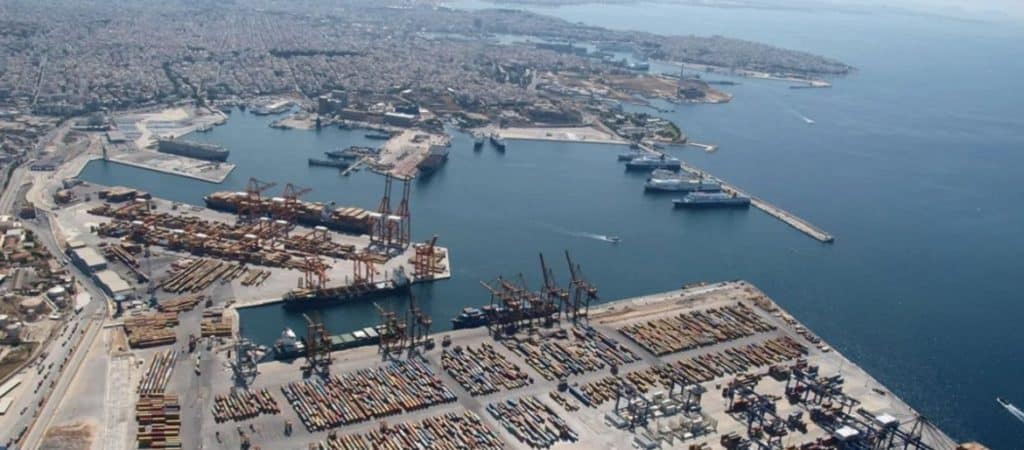By Dr Khushnam P N

China is in pursuit of developing and upgrading port in Israel, Lebanon, Greece and Syria for some time. Put together, there are six ports- Haifa and Ashdod in Israel, Tripoli in Lebanon, Piraeus in Greece and Latakia and Tartous in Syria.
The commercial value of the ports from the Chinese commercial strategy of “Belt and Road Initiative” is immensely huge, and their strategic importance can turn them into a Chinese “String of Pearls” in the Eastern Mediterranean, and have numerous geostrategic implications and geopolitical consequences.
“String of Pearls” is used to explain the Chinese geopolitical vision to create a strategic chain of ports and bases along the strategic sea lanes with the aim of serving its commercial interests and military influence in a region. Shanghai International Port Group (SIPG) won the bid to expand the Container Terminal of Haifa port, Israel which is due to be inaugurated next year (2021) and will be run by the Chinese company for 25 years. In addition, a Chinese government-owned firm, China Harbour Engineering Company (CHEC) has won to build the port of Ashdod. The deals have brought to the fore many strategic and security issues of Israel- US relations.
The port of Haifa is of utmost strategic value as it hosts the Israel’s alleged nuclear-armed submarine nearby and the US Sixth Fleet considered it as home port, a number of ships visit the port every year. In addition, the US ships also visits the Israeli port of Ashdod. The US 6th Fleet, headquartered in Naples, Italy conducts many joint exercises like Noble Dina, Noble Melinda and Juniper Cobra exercises with the Israeli navy in the strategic Mediterranean Sea. The United States is concerned that closer Chines ties with Israeli and access to its infrastructure may enable it to access the secret intelligence communication.
The Chinese activities have been the matter of larger US-Chinese battle for dominant position in the Eastern Mediterranean. The issue can be traced back to 2000, when Israel was forced to cancel its planned sale of the Phalcon (Airborne Warning And Control System-AWACS) to China with the US warning that it could lose the support of the latter. The sensitive intelligence sharing between the US and Israel and sale of most classified weapons and military hardware like the F-35, 5th generation stealth fighter jet to Israel make US very perturbed with the Chinese increasing involvement in Israeli infrastructure as it will be vulnerable to probable Chinese espionage.
The China Ocean Shipping Company Ltd (COSCO) of China was progressively at work in the Greek port of Piraeus and took over its two main container terminals in 2008 on a 35 year lease. With its continuous political and diplomatic pursuits, the Chinese Shipping giant (COSCO- third largest container shipping company of the world) has taken over the remaining Third container terminal and the Piraeus port authority to run until 2052. With the 600 million euros investment the Chinese company is planning to convert the port into the biggest commercial harbour and boost it to become the unrivalled hub of the growing Asia-Europe trade. And with the acquisition of this strategic port at the gate of Europe, known as “Pearl of the Mediterranean”, China strongly enters the heart of Europe.
Next in the series is the Tripoli port in Lebanon. The China harbour Engineering Company Ltd (CHEC) is at work in deep sea port of Tripoli to upgrade it so that it can accommodate the larger vessels. Besides, to enable the port to perform the new role, another Chinese firm, Qingdao Haixi Heavy-Duty Machinary Co. sold two 28-storey container cranes so that it is capable of servicing 700 containers per day. The capacity check was performed by the docking of a huge container vessel of COSCO in December, 2018 and a formal inauguration of new maritime route between China and Mediterranean was made.
Thus established in the strategic port, the Chinese government is trying to make Tripoli part of its “Belt and Road Initiative” and turn it into a special economic zone, and an important transhipment point between China and European market. The Chinese Construction companies are planning to connect the port with developed transportation network by building an advanced railway connecting it with Beirut and further to Homes and Aleppo in Syria. The port is being equipped with latest technology and infrastructure and by 2022 will become a strategic logistics location of whole region and land routes connecting Mediterranean to Central Asia what China wants for long to avoid Suez transit and reduce time.
The diplomatic channels of the Chinese have played a consistent role in supporting the Syrian regime of President Assad throughout the civil war. Its embassy in Damascus remained open and not only provided political and diplomatic support to the Syrian government but also played dominant role in vetoing anti-Damascus resolutions in the UN Security Council. The reconstruction process of post-conflict Syria is holding the chance of Chinese leading role in the country given the US, European and Gulf countries role so far and financial inability of the Chinese partners, Russia and Iran.
Besides, China is planning to connect the emerging Tripoli hub with the Syrian cities and interior to bring the war-torn country under its economic network and remain unchallenged by any other power at later stage. Tripoli port is around at 30 km from the Syrian border and the Chinese infrastructure companies are already at work to connect two Syrian cities Homes and Aleppo with railroad from Tripoli via Beirut.
In addition, it is in close negotiation with the Syrian government, particularly the Transport Ministry to establish a maritime industries city between Tartous and Latakia with a vision to dominate Syrian coastline as per the Syrian-Chinese Business Council. Thus, gradual Chinese involvement in Syrian reconstruction will likely give it access to its strategic ports of Tartous and Latakia, completing its ‘string of pearls’ in the Eastern Mediterranean.
The developments assume an additional significance with the historic joint drills of Russian and Chinese navies in 2015 in the region which has been dominant domain of the NATO and US coalition force. Thus, the growing Chinese influence in the region with increasing control of the chain of ports in the eastern Mediterranean posing a grave challenge to US, NATO and the European powers and their strategies with numerous implications.
The recent remarks of Mike Pompeo, the secretary of State of United States during his visit to Israel on 13th April, 2020, has asked Tel Aviv to give due reconsideration to its joint projects with China. Earlier, the US had asked the Israeli government to sever ties with China particularly in areas which run potential risk to security and intelligence communications. These concerns are part of the larger US-China competition.
The “String of Pearls” of eastern Mediterranean is the manifestation of a change of the strategic landscape in which China is pushing and filling every space decisively wherever US is weakening or withdrawing from as a global power in the distant regions like Mediterranean, a traditional bastion US-led NATO coalition. These ports are surely the building blocks of its “Maritime Silk Route” vision facilitating its trade across Asia and Europe but it also augments its naval presence to counter risk to its trade, interests and global power pursuit.
Author: Dr Khushnam P N Independent IR and Regional Security Researcher and Analyst (Theories of IR & Regional Security, Politics and Security in West Asia, Indian Foreign Policy, Iran-Israel & US, Indo-Pacific, Geopolitics and Multilateralism). Specialization: Iran, US & Gulf Security. Bangalore, India
(The opinions expressed in this article are solely those of the author and do not necessarily reflect the views of World Geostrategic Insights)







